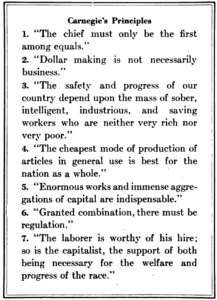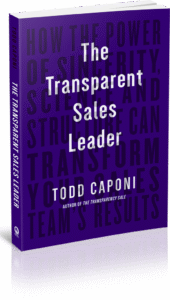“I believe…” It’s a professional exercise I do every year…to revisit my beliefs about our profession. Have you ever written down your professional beliefs?

Andrew Carnegie’s Principles, found in System Magazine, August 1922
Throughout history, the beacons of industry all did it…and often published them. John Patterson, Charles Schwab, Andrew Carnegie, and countless others used them. It kept them centered. It created alignment. It inspired them and their teams. And for me, they’re my swim lanes for what I write about, speak about in my keynotes, teach in my workshops, guide my advisory work, and inspire me.
- Get out a piece of paper, open a Google Doc, or walk up to a whiteboard.
- Write the words, “I believe…”, then finish the sentence.
- Write no more than a paragraph about it, then move on to the next. (also, not a bad exercise to do personally, too…but for now, focusing on business)
For those who care, here are my ten primary beliefs about the profession from which we (mostly) all reside. I have more…but I’ll spare you:
1. I believe that transparency sells better than perfection:
There’s a reason why we all read negative reviews first when a website is acting as a salesperson, and why a product with nothing but 5-star reviews doesn’t sell as well as one with a 4.2-4.5 average. That’s when a website is acting as a salesperson, but also when a human being is, too. Leading with transparency speeds sales cycles, increases win rates, and massively improves qualification and pipeline efficiency.
2. I believe that cards-face-up negotiation is the way forward:
In a subscription economy, FBI-style tactics, extreme positions, word art, and negotiating as though your life depended on it must be retired. Cards face-up negotiations lead to building trust through the goal line, more valuable deals, more predictable deals, and significantly higher long-term customer value.
3. I believe that revenue leaders can have structure and a framework like salespeople do:
As a revenue leader, everything you’re responsible for falls into one of five categories —initially and ongoing. It doesn’t matter if it’s your first leadership role or your twentieth. Once internalized, you always have a 30-60-90 day plan in your back pocket. You can plan. You can consistently communicate. You can see holes before they form. You’ll set yourself apart from the pack.
4. I believe that all revenue leaders should understand the science of intrinsic inspiration:
If you believe sales professionals are coin-operated, you’re right…if you’re doing it wrong. Revenue leaders who create an environment where their team wants to stay, do their best each day, and tell their friends how great their job is don’t count their hours. There’s a framework that’s easy to understand and implement. Variable compensation becomes the reward for doing work they love to do, instead of the reason they do it. Performance rises. Turnover goes down. Recruiting gets easier.
(I dedicate a whole section of The Transparent Sales Leader to teaching this important element of leadership).
5. I believe that it is possible to create and maintain an accurate and dependable forecast:
As a profession, we shifted from wholly buyer-centric sales processes and forecasting methodologies to wholly seller-centric. Every CRM and every sales process is systemically seller-focused with stages like qualification, discovery, demonstration, propose, and close. No wonder we can’t predict when a buyer will buy! Buyer-centric processes and forecasting methodologies are the way forward.
6. I believe that the modern sales profession’s founding in the late 1800s has so much to teach us:
While so many exclaim that the sales profession has evolved, in some ways it has. However, its foundation laid 130 years ago has considerable lessons – both positive and lessons-learned, that can get our profession back to a time when it was invited, trusted, respected and admired…when every college offered it as a focus, and even high schools…when Presidents spoke at sales conferences.
7. I believe that we, as human beings, don’t buy when we’re “convinced” – we buy when we can predict:
Arthur Sheldon, in 1911, exclaimed, “True salesmanship is the science of service. Grasp that thought firmly and never let go.” We let go. We don’t buy when we’re “convinced”, or when we do, we’re pissed about it shortly thereafter. More information available to buyers hasn’t made it easier on buyers, it’s made it harder. That’s why the profession has grown along with the proliferation of information, not shrunk. Sellers doing the homework for the buyer – advising, consulting, and adding value by helping buyers predict their outcomes and the journey to get to it versus “selling” and “convincing” is what sustains the profession, and rebuilds its reputation.
8. I believe that we are all biased in our perception of a reward by the journey to get to it:
The key to getting customers who buy, stay, buy more and advocate is by setting accurate expectations, and consistently meeting them. Not overcommitting and underperforming. Not under-committing and overperforming. Accuracy. It’s why many of the greatest brands in the world succeed – the IKEAs, the Costco’s, those who embrace what they give up to be great at their core consistently win. It’s likely a big reason why you keep losing to the status quo – an unclear or complex journey makes the reward look smaller! And it’s a huge opportunity for the B2B space.
9. I believe in retiring the word “commit”, and in celebrating losses as emphatically as wins:
Creating an environment for accurate forecasting is as important as the forecasting skill itself. Forcing team members to “commit” to a deal or a number causes us to lose slowly, causes us to go to our leaders LAST instead of FIRST when something’s wrong, and causes us to use our most valuable asset – our time – inefficiently, lowering overall performance. By eliminating the “commit”, and actually celebrating losses for the effort and lessons learned, we lose faster, lose less often because we’re not repeating mistakes, improve morale, and improve performance.
10. I believe that there are incredible learnings on how we, as human beings, learn:
Yet, so little of those learnings are actually used in how we enable our teams, and how those teams enable our current and future customers. This is a key area of study for me in 2023…
You can dig into these concepts in my books:
Or, just reach out. info@toddcaponi.com, or through my website at www.toddcaponi.com.







0 Comments